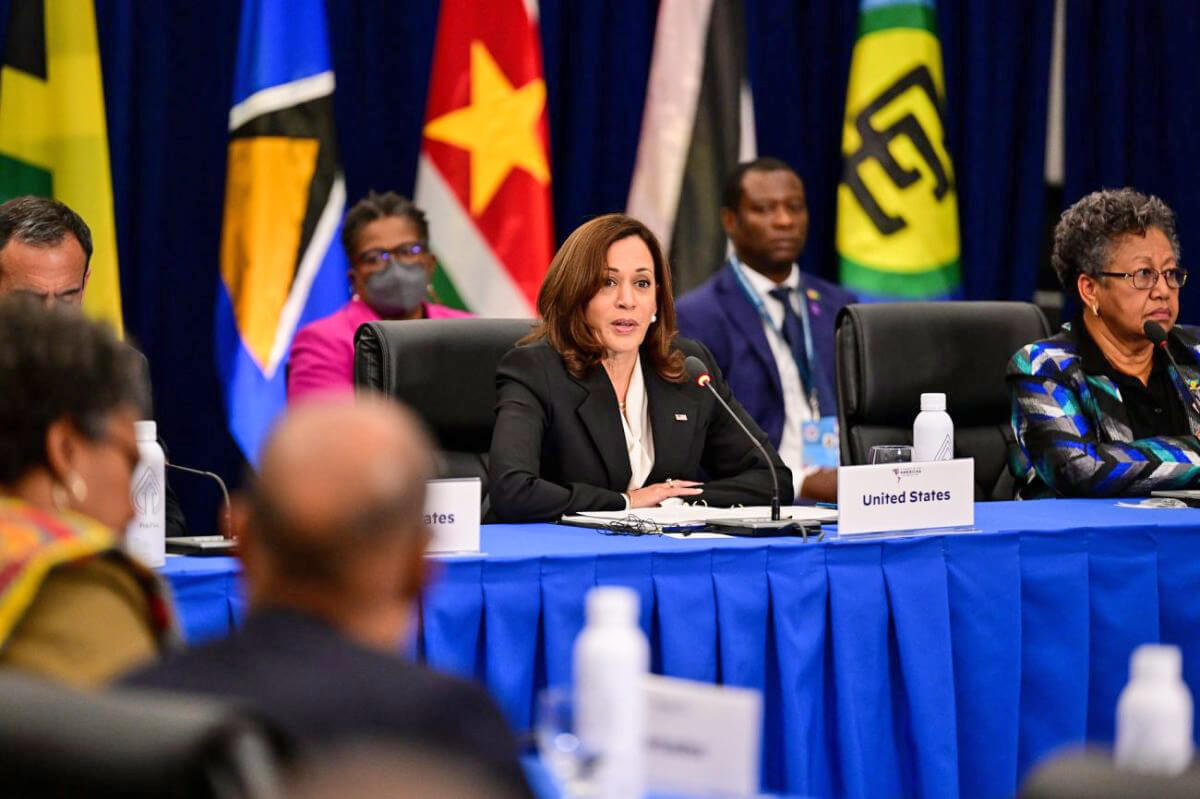
US Vice President Kamala Harris speaks to Caricom presidents during the 9th Summit of the Americas at the Los Angeles Convention Center in Los Angeles, California, USA. Photo: Ben Solomon/US Department of State/File photo.

Orinoco Tribune – News and opinion pieces about Venezuela and beyond
From Venezuela and made by Venezuelan Chavistas

US Vice President Kamala Harris speaks to Caricom presidents during the 9th Summit of the Americas at the Los Angeles Convention Center in Los Angeles, California, USA. Photo: Ben Solomon/US Department of State/File photo.
The government of Venezuela criticized the regional organization Caribbean Community (CARICOM) after the organization claimed that the Venezuelan consultative referendum on the Essequibo “has no validity or standing in international law.”
“The Referendum is a purely domestic construct, but its summary effect is likely to undermine peace, tranquility, security, and more, in our region,” CARICOM stated in a communiqué.
STATEMENT BY CARICOM ON THE GUYANA-VENEZUELA BORDER CONTROVERSY#CARICOM notes the decision of the Venezuelan National Assembly to conduct a popular referendum on defending Venezuela’s claim of the Essequibo.
Read the full statement at: https://t.co/kf7TYJuPDl pic.twitter.com/Qc8b4EunZH
— CARICOM: Caribbean Community (@CARICOMorg) October 25, 2023
CARICOM stated that two of the approved questions on the referendum, if answered in the affirmative, “would authorise the government of the Bolivarian Republic of Venezuela to embark on the annexation of territory, which constitutes part of the Cooperative Republic of Guyana, and to create a state within Venezuela known as Guyana Essequibo.”
The CARICOM statement added that “international law strictly prohibits the government of one State from unilaterally seizing, annexing or incorporating the territory of another state,” and that “an affirmative vote as aforesaid opens the door to the possible violation of this fundamental tenet of international law.”
Venezuela Announces Questions for Consultative Referendum on Essequibo Territory
The CARICOM statement pointed out that the language of two of the proposed questions could lead people to think that Venezuela may use “all means” including force or war to achieve its objectives.
“CARICOM earnestly hopes that Venezuela is not raising the prospect of using force or military means to get its own way in this controversy over territory,” The statement further added. “After all, it has been the long-standing position of Latin American and Caribbean counties, including Venezuela, that our region must remain a zone of peace.”
Venezuela’s position
The government of Venezuela, through a communiqué issued by the Foreign Ministry, criticized CARICOM’s position on the referendum. It also highlighted the right of the Venezuelan people to express their opinion on the issue as well as to continue fighting for a peaceful resolution to the territorial conflict.
#Comunicado El Gobierno Bolivariano toma nota de la posición asumida por Caricom respecto al reclamo legítimo de Venezuela sobre la Guayana Esequiba. Reiteramos el derecho de nuestro pueblo de expresar su opinión sobre el tema y de continuar luchando por una resolución pacífica… pic.twitter.com/QTO0RvsFsL
— Yvan Gil (@yvangil) October 26, 2023
“The territorial dispute between Venezuela and Guyana should be resolved amicably, in a manner acceptable to both parties,” the statement said.
The Venezuelan government reiterated that “Venezuela has been, is, and will continue to be a nation of peace, as it has demonstrated throughout its history.”
Venezuela’s Electoral Council: Referendum on Essequibo is Scheduled for December
The questions
The referendum, scheduled for December 3rd, poses the following five questions:
(RedRadioVE) by Milena Bravo
Translation: Orinoco Tribune
OT/SC/DZ